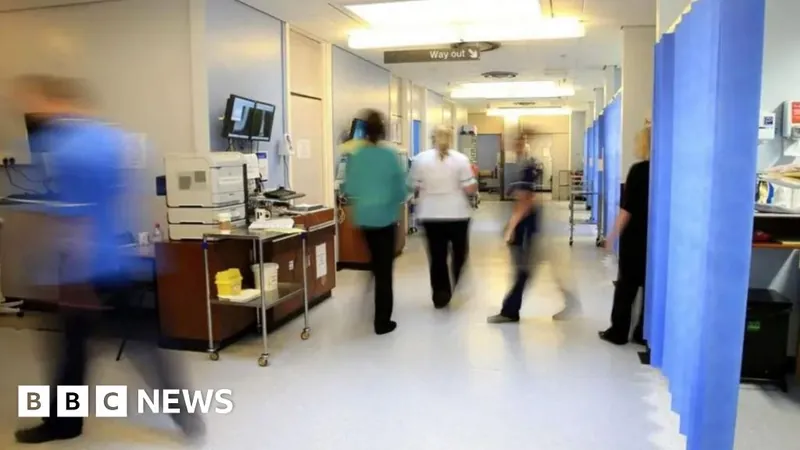
Crisis at Royal Liverpool Hospital: Patients Face Unprecedented Waits as A&E Declares Critical Incident
2025-01-07
Author: Siti
Introduction
In an alarming turn of events, patients arriving at the Royal Liverpool University Hospital's Accident and Emergency department are facing excruciating waits of up to 50 hours. The Liverpool University Hospitals NHS Foundation Trust has officially declared a 'critical incident' owing to an overwhelming surge in patient demand, primarily due to a spike in flu and other respiratory illnesses.
Government and Health Authority Response
Authorities are urging the public to only visit A&E for genuine medical emergencies, highlighting the dire situation faced by healthcare services across the region. Labour MP for Liverpool Riverside, Kim Johnson, has called on the government to act swiftly and devise a robust strategy for increased NHS funding. The critical situation isn't limited to Liverpool; similar incidents have been reported in East Midlands, Birmingham, Devon, Cornwall, Northamptonshire, and Hampshire.
Critical Incidents Across the Region
The East Midlands Ambulance Service, for the first time in its history, has declared a critical incident, citing 'significant patient demand, pressures within hospitals, and flooding' as exacerbating factors. Health officials are particularly warning those suffering from flu, Covid, norovirus, or respiratory syncytial virus (RSV) to refrain from seeking treatment at the Royal Cornwall Hospital's A&E.
Impact on Local Hospitals
Derriford Hospital in Plymouth is also grappling with a critical incident due to an influx of patients. Hampshire Hospitals has similarly reacted to ongoing pressures at its Basingstoke and Winchester hospitals by declaring a critical incident, as has University Hospitals Birmingham due to a notable rise in flu cases requiring hospitalization.
Emergency Measures Implemented
The spokesperson for the Liverpool University Hospitals NHS Foundation Trust explained that emergency measures are now in place. Managers have the directive to seek additional support and implement immediate changes to safeguard patient care. They noted that the declaration of a critical incident was essential to address 'exceptionally high demands on our emergency department.'
Healthcare Staff Response
Despite the daunting circumstances, healthcare staff are working tirelessly to provide care as quickly as possible. However, patients are warned that those with less severe conditions may experience longer delays. Non-emergency patients are encouraged to utilize alternative services such as local pharmacies or GP appointments.
Infection Control Measures
As flu and respiratory illnesses continue to rise, the health trust has enacted additional infection control measures. Patients and visitors are advised to maintain strict hand hygiene, limit hospital visits to necessary areas only, and wear masks in clinical settings when requested.
Expert Insights
Dr. Jim Gardner, Chief Medical Director, informed that some patients are currently on trolleys due to the situation and it may take 'a few days to clear the backlog.' He emphasized that a triaging system is being employed to ensure that the most urgent cases are prioritized.
Political Response and Advocacy
In this critical context, Kim Johnson notes that the situation highlights 'the critical challenges our NHS faces, particularly concerning ongoing staffing and capacity crises.' She has urged the immediate implementation of a comprehensive plan for NHS funding, recruitment of healthcare professionals, and investment in social care to enhance patient discharge processes.
Addressing Health Inequalities
Critically, Johnson pointed out that Liverpool Riverside is England's most deprived constituency, underscoring how poverty drives health inequalities. 'Addressing poverty at its roots is essential to improve health opportunities and ease the pressure on A&E services,' she asserted.
Appreciation for Healthcare Workers
Johnson expressed gratitude for NHS staff's relentless dedication amid these trying times, insisting that the Labour party must support efforts to reconstruct a sustainable health service for everyone.
Current Hospital Statuses
In nearby Merseyside, Arrowe Park Hospital declared a critical incident over the weekend but has since downgraded the alert. Whiston Hospital has indicated that it reached Opel 4 status - the highest demand grading in the NHS system - highlighting the urgent need for comprehensive care to ensure patient safety.
Conclusion
With the situation surpassing last year's challenges, the healthcare community and the public alike are left grappling with the urgency of reforms needed to safeguard the well-being of patients across the region. What does this mean for the future of the NHS? Only time will tell!
 Brasil (PT)
Brasil (PT)
 Canada (EN)
Canada (EN)
 Chile (ES)
Chile (ES)
 Česko (CS)
Česko (CS)
 대한민국 (KO)
대한민국 (KO)
 España (ES)
España (ES)
 France (FR)
France (FR)
 Hong Kong (EN)
Hong Kong (EN)
 Italia (IT)
Italia (IT)
 日本 (JA)
日本 (JA)
 Magyarország (HU)
Magyarország (HU)
 Norge (NO)
Norge (NO)
 Polska (PL)
Polska (PL)
 Schweiz (DE)
Schweiz (DE)
 Singapore (EN)
Singapore (EN)
 Sverige (SV)
Sverige (SV)
 Suomi (FI)
Suomi (FI)
 Türkiye (TR)
Türkiye (TR)
 الإمارات العربية المتحدة (AR)
الإمارات العربية المتحدة (AR)